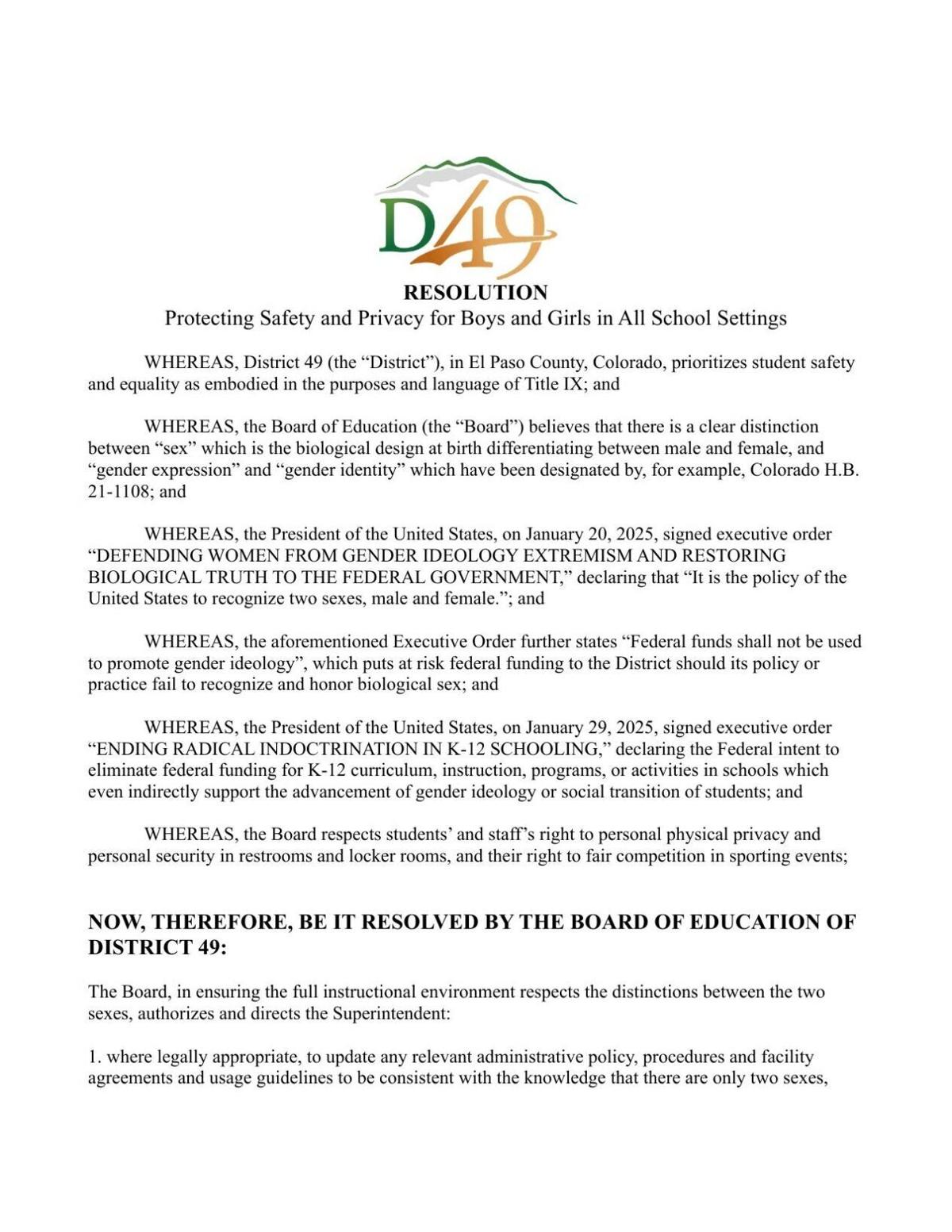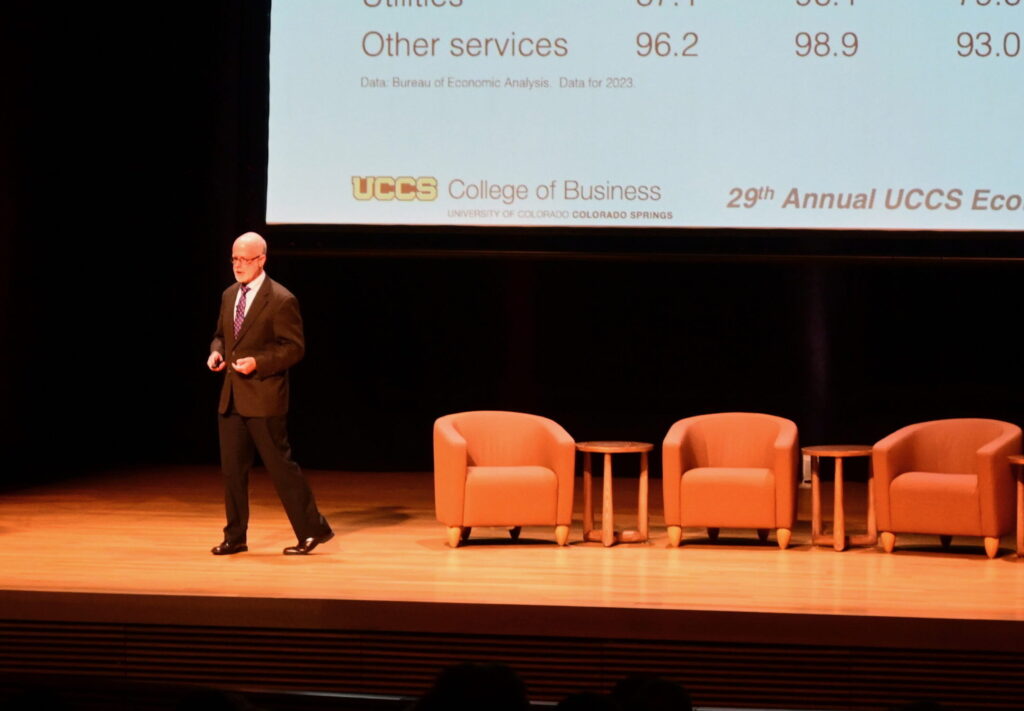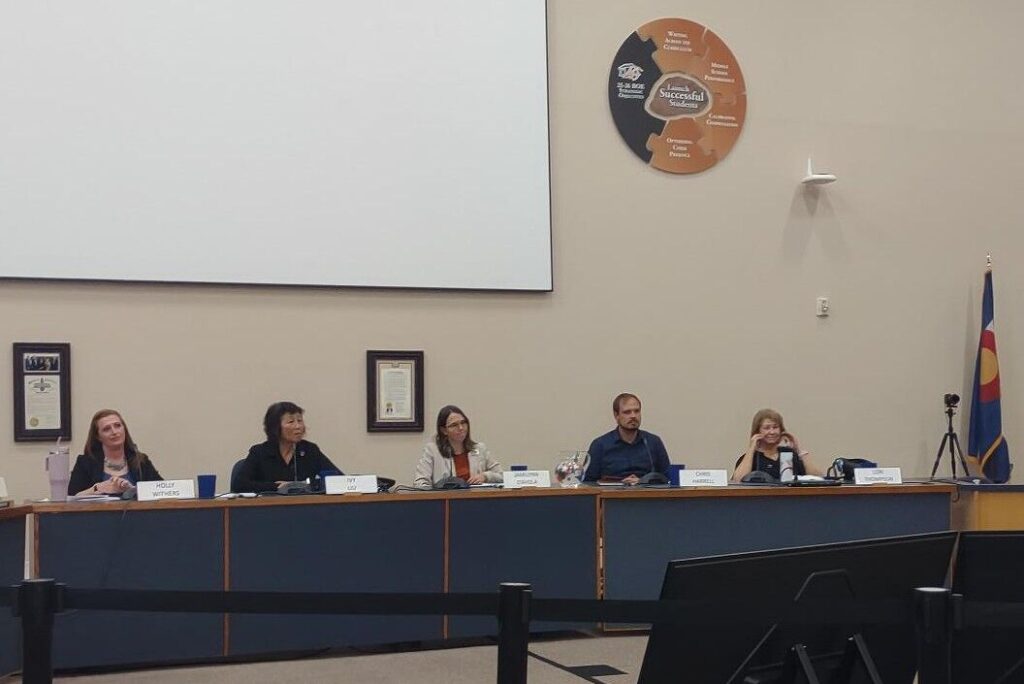El Paso County School District 49 discussing resolution to recognize two sexes
Following executive orders by the Trump administration, El Paso County’s largest school district has begun discussions that may soon spread across the state and country.
During a work session Wednesday night, School District 49’s board of education discussed the passage of a resolution that would update existing policies and procedures to acknowledge that there are two biological sexes that are distinct from one’s gender identity and expression.
The purpose behind the resolution is to specifically address students’ use of school lockers and bathrooms and involvement in school sporting events based on their biological sex.
Woodland Park RE-2 passed a similar resolution two months ago.
Woodland Park school district passes resolution to recognize two sexes
Much like that district, D-49’s resolution comes following an executive order by President Donald Trump declaring that “It is the policy of the United States to recognize two sexes, male and female” and that “Federal funds shall not be used to promote gender ideology.”
The resolution also references an executive order entitled “Ending Radical Indoctrination in K-12 Schooling,” which mentions cutting federal funding “for illegal and discriminatory treatment and indoctrination in K-12 schools, including based on gender ideology and discriminatory equity ideology.”

Courtesy of School District 49
While the resolution notes the risk of lost funding, board President Lori Thompson said it also addresses long-standing issues regarding personal privacy and safety in schools.
“I personally can tell you that I think the design of the future is going to be a lot of private spaces, more privacy for our students,” she said. “And I’ll tell you the truth, I’ve been in favor of that since the late ’70s because I felt awkward in locker rooms, I felt awkward with private spaces.”
“And so, anyone that thinks this is intended to be an attack against anyone really needs to look at where boards are going to be put in a position.”
While there are few resolutions like this in Colorado, D-49 attorney Brad Miller told The Gazette his office “has been contacted by multiple schools and districts related to this.”
Specifically, groups like the Colorado High School Activities Association (CHSAA) and the state lawmakers contravening the federal understanding of Title IX or remaining ambivalent on these matters have been some of the concerns raised, Miller said. Among the school districts he also represents in Colorado is Woodland Park RE-2.
Some board members argued the point of the resolution.
Board member Mike Heil, describing the resolution as “performative and unnecessary,” contested the validity of the executive orders’ definitions of male and female and how they seem to exclude people with Swyer syndrome — a condition in which people have XY chromosomes and female reproductive organs and are able to give birth — while also noting conflicts with state statutes and the small number of students to whom the updated policies would apply.
“I should have been giving my attention this week to the 144-page comprehensive financial report we briefly discussed (tonight),” he said. “Instead, we’re dealing with what looks to me to be just a distraction.”
He then added how the board was downgraded on the district’s “value all people” firm foundation on its recent evaluations.
“This is a perfect example of why,” he said.
D-49’s student representative at the meeting, Meron Hoffman, asked if the resolution was pre-emptive or if it would immediately address something specific. Thompson affirmed that it was pre-emptive, given the possibility of losing federal funding and added that it honors individuals’ personal beliefs and privacy.
During the meeting, Miller said the resolution and its current language is “in effect, aspirational” and “in anticipation of what may follow from these executive orders,” despite that they are not law.
Superintendent Peter Hilts noted that the unaddressed procedure mentioned in the resolution is its third item regarding trans students’ athletic involvement and how this may change.
“So, we would be helping develop precedent, were we to focus on item three,” he said.
“But it is also the board’s prerogative that, if you want this to be the place where you take a stand, it is the board’s prerogative to take a position that invites a legal reading or that invites, potentially, a statutory change. I would predict, in Colorado, that both or either of those things would follow along pretty quickly.”
Miller echoed this suggestion, saying the resolution could signal to other school districts and legislators a stance and perspective that may lead to changes elsewhere.
“This is going to catch someone’s attention and that might have value,” he said.
Federal orders vs. state laws
Passed in 2021, Colorado House Bill 21-1108 added “gender expression” and “gender identity” to terms regarding protected classes from discrimination. Among the statutes prohibiting such discrimination include local school boards’ employment policies and enrollment in schools.
Additionally, the Colorado Supreme Court’s decision in the Coy Mathis decision of 2013 ruled that transgender students must be allowed to use bathrooms that match the gender with which they identify at school.
Transgender 6-year-old wins civil rights case against Fountain school district
With this in mind, Hilts clarified the district’s procedures in place for these instances and noted how they are “highly individualized” for students and “have begun from a place of care and respect” with parents’ involvement.
“This isn’t as much an issue of crossing the streams of gender, sex and expression as it is about caring for individual children in the context of their family, their system, their school,” he said.
Since there has been a system of procedures over the past 10 years, and the executive orders alone don’t supersede either of them, board member Marie La Vere-Wright said she didn’t see the point or need to introduce the resolution.
“And we are compelled by the state to do it and the state provides more funding than the feds do,” she said.
According to the financial report presented earlier in the meeting, D-49 received over $22.5 million in revenue from federal sources for the 2023-24 school year. By comparison, it received $100.8 million and $117.3 million from local and state sources, respectively.
Lindsey Lee is the vice president of the community organization Neighbors for Education and a parent of two D-49 children — one of whom identifies as nonbinary — and said she hasn’t heard of any incidents regarding trans students in school bathrooms since the Mathis decision.
“I have had no complaints about the current experiences they’ve had in their schools,” she said. “They always have been accommodated, the school administration has been fantastic and … no one has explained yet (to me) why this resolution is needed.”
Public response
Representatives from the local LGBTQ+ support organization Inside Out Youth Services attended the work session. Ollie Glessner, the group’s communications and advocacy director, said the resolution “was very much aligned with talking points out of the federal administration and various groups across the state” and that it seemed like it was meant to quickly get approved without much public input.
Glessner added that while it sounded like a good step toward improving privacy on paper, it would likely be “an expensive proposal” and is more likely meant to target trans students.
During their discussions, board members acknowledged the large number of emails they received expressing both approval and disapproval of the resolution. Because of the amount of feedback they received ahead of the meeting and the lack of consensus, the board ultimately agreed to give the topic more time for discussion.
Glessner said Inside Out Youth Services was encouraged by this decision and that the group plans to schedule meetings with board members to discuss the topic in more detail.
“If they want to send a message that targets their trans students, they have the power to do so, but that would not be reflective of the entire District 49 community,” Glessner said.
The board voted to delay its vote and receive additional legal advice and guidance from Hilts during an executive session on April 3. It will then vote on an updated resolution at its next regular meeting on April 10 so that the public is given time to view the changes.
Lee said she and Neighbors will continue to engage community members ahead of the meeting. She added that, whether the board votes to approve the resolution, she expects neighboring school districts like D-11 and D-20 to explore their own resolutions.
“This is a regional issue. This is not just local to us,” she said.











